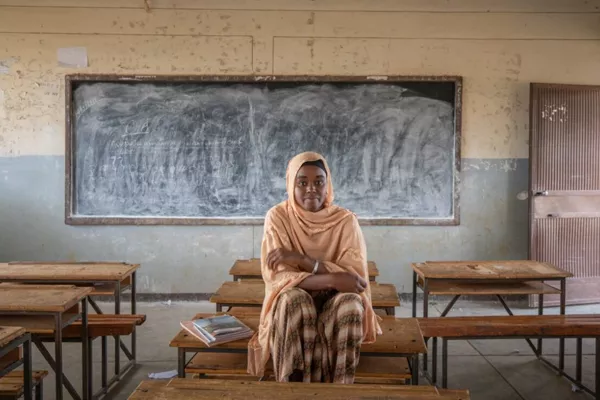Preventing early and forced marriage in Ethiopia through active child participation

© Petterik Wiggers
Ethiopia has some of the highest rates of child, early, and forced marriage, with 4 in 10 girls getting married before turning 18. While gender-based violence, such as female genital mutilation and child marriage, had been on the decline in Ethiopia, complex humanitarian crises, such as conflicts, frequent and prolonged droughts and related displacement, have exacerbated gender-based violence in recent years.
16-year-old Zala* has big plans for her future. “I want to finish school and become a doctor. I like to help people and want to treat patients so they become healthy again,” says Zala, who lives in the Oromia Region in Eastern Ethiopia.
For some time in her youth, Zala did not dare dream of returning to school. At 12, she was forced to drop out of school to travel with her aunt to the Somali region in Ethiopia. She did not know that she was supposed to get married there.
“At that age, you don’t really understand what love or marriage is,” says Zala. “When my future husband approached me and said he loved and wanted to marry me, I felt very insecure. I did not want to marry him. I was not interested. But my father had given his will. I had no other options and was afraid of what my family would say.”
Zala only stayed for four months with her husband and his family. Throughout her marriage, she felt a lot of pain and discomfort. Eventually, her mother visited her and convinced her daughter to come home with her. After returning to her family, she realized that she was pregnant but later suffered a miscarriage.
In addition to the pain and the adverse effects on her health from being married at an early age, girls like Zala, once they can return to their family, are confronted with a lot of stigmas. Communities often reject divorced girls, so they can’t return to school or enjoy a proper social life in their villages. “I faced a lot of stigma after returning to my community, which is why I decided to move to Djibouti to find a job and earn some money,” says Zala with pain in her eyes.
Power to children and young people
To tackle the alarming numbers of child marriage and its implications on girls in the Oromia Region, Joining Forces for Africa, an alliance of the six largest child-focused INGOs working to end all forms of violence against children, has introduced different community and school-based programs in the districts of Babile and Chinaksen. SOS Children’s Villages Ethiopia, one of these projects' implementing partners, supports increasing child participation by conducting campaigns and awareness-raising events on children’s rights and early marriage, among other child protection topics. Now, children and young people are taking the lead in efforts to eliminate early child marriage and other traditional practices that harm them.
Through functional and active children’s clubs, partnerships with local governments, and community-based child protection groups, the project aims to facilitate the communication and links between actors involved in child protection to identify and resolve child marriage issues.
In the first year after implementing the project in the Babile district, the number of child marriage cases has significantly decreased, and concurrently, there has been a significant increase in the enrollment of girls in school. The outcomes of the children’s platforms also had an immediate impact on communities, as religious leaders in the respective communities are now not providing their blessings to marriages involving children or with no full and explicit consent of women. The project's results prove that child participation and leadership significantly contribute to social change.
A role model for girls who return to school
When Zala returned from Djibouti, she initially refused to return to school. “I was afraid of my peers and the community. People try to shame girls like me who go back to school at my age,” says Zala.
After receiving support from SOS Children’s Villages Ethiopia through intensive counselling at home, Zala returned to school in 2021.
“In the beginning, I felt uncomfortable because I was much older than the other boys and girls in my class. But thanks to the support of SOS Children’s Villages and JOFA, I felt empowered and decided to tackle all those stigmas around girls who were married but wanted to pursue their education. I want to learn, no matter the grade I am in, and not lose out to social stigmas,” says Zala with confidence in her voice.
Zala has become a role model in her school and community, advocating to end child marriage and raising awareness amongst her peers and their families on the negative implications of child marriage on girls’ health and development.
“There are a lot of other girls who are affected by child marriage, and many boys and girls think it is normal to get married at an early age because it is a common practice in my community,” says Zala. “I want to show them that it’s possible to overcome stigmas and pursue education. We are organizing different social groups and initiatives. There is also an active girls’ club in my school that meets twice a month. A club leader from my school facilitates these meetings, where we can raise our concerns.”
“I want other girls to know that to live a happy and self-determined life, it is important to be educated. Even if you dropped out of school, it is never too late to return and catch up on your dreams.”
* Name changed to protect privacy.
